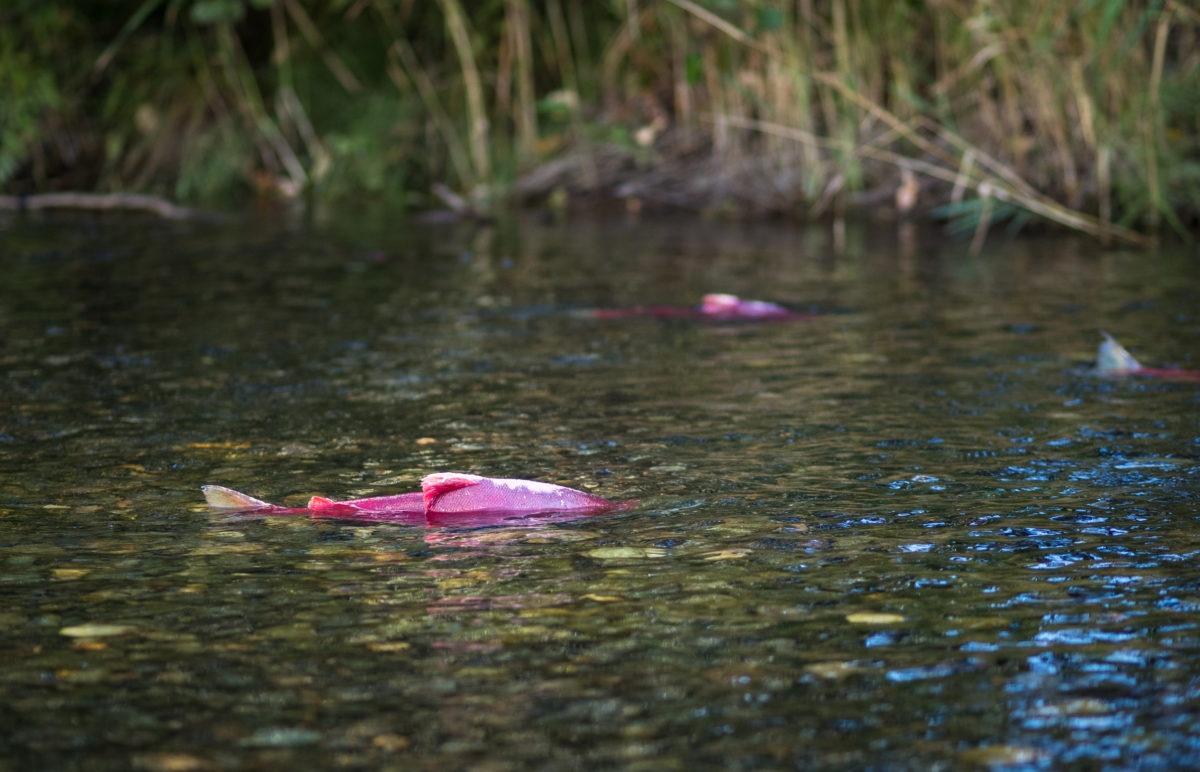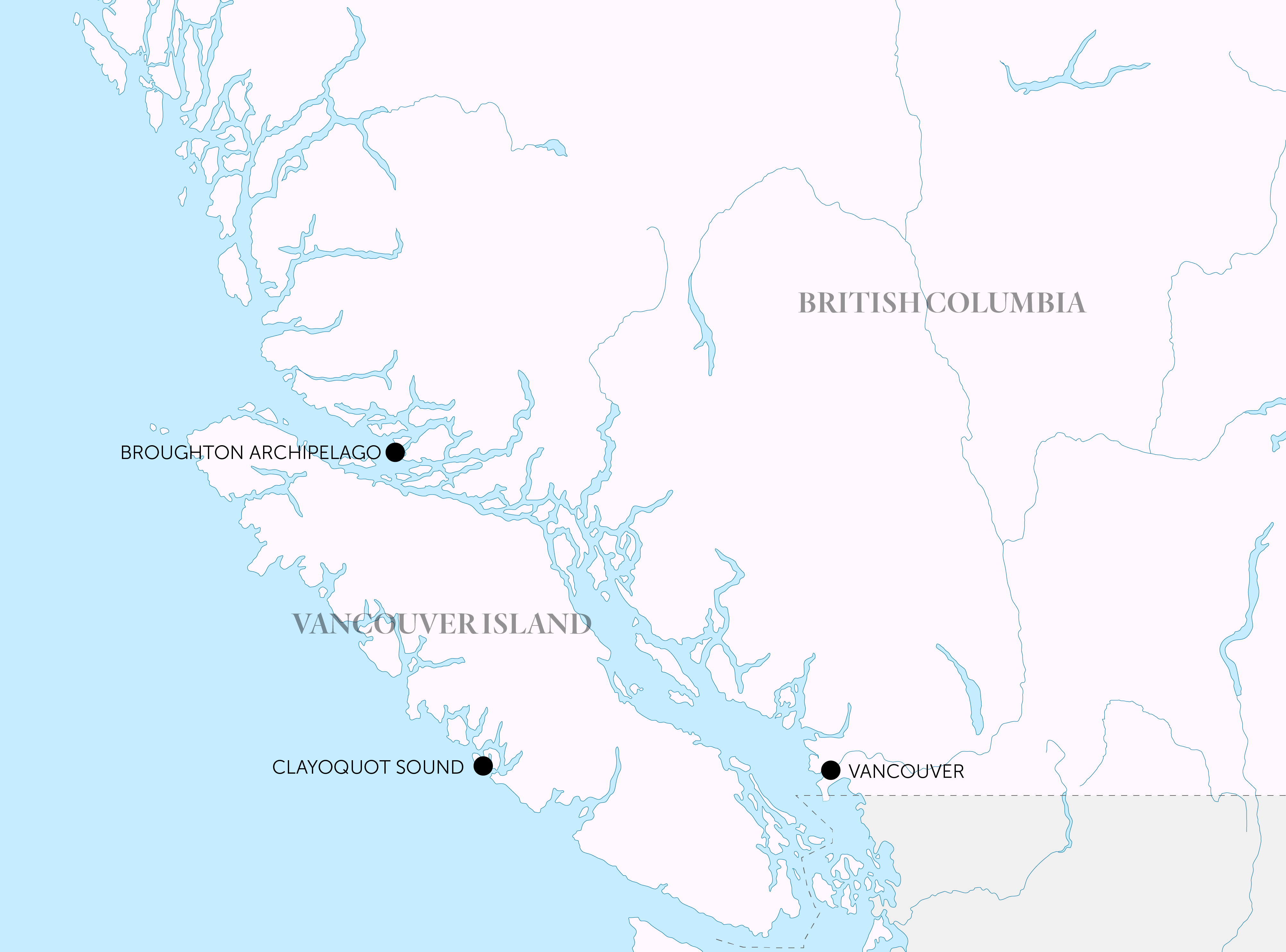
‘Afraid of the water’? Life in a city that dumps billions of litres of raw sewage into lakes and rivers
10 billion litres of sewage are dumped into Winnipeg’s lakes and rivers each year. Some...
Several more fish farms are set to be removed from coastal waters after three First Nations chose not to consent to their continued operation in the Broughton Archipelago.
Fish farms in this region between the north end of Vancouver Island and the mainland require the Nations’ consent to continue operating under a 2018 agreement between the ‘Namgis, Kwikwasut’inuxw Haxwa’mis and Mamalilikulla First Nations and the B.C. government.
With removal of the farms, “each flood tide that comes in and each ebb tide that goes out our waters will get cleaner,” Kwikwasut’inuxw Haxwa’mis Hereditary and Elected Chief Tlakuglus, Rick Johnson, said in an interview.
“For us it’s all to do with our wild salmon, the survival of our wild salmon,” he said. “We’re salmon people.”
“Sadly, we have been witnessing the devastating decline and collapse of wild salmon and other marine species in our territories that have been the foundation of our food, culture and way of life for millennia,” Johnson said in a press release this week.

With the decision to end salmon farming in the region, he said the nations can start to rebuild those populations.
“We’re over the moon,” he told The Narwhal.
The two salmon farming companies affected by the decision, Mowi Canada West and Cermaq, have agreed to respect the First Nations’ decision, according to the press release.
A spokesperson for Mowi Canada West, said the decision was “not unexpected.”
“We have planned for this outcome and no additional business impacts are anticipated. We can now turn our energy and attention to areas in which our farming operations are welcomed by Nations,” the spokesperson said in a statement to The Narwhal.
Cermaq did not respond to The Narwhal’s request for comment by publication.
It was in the wake of extensive protests, including the occupation of fish farms by First Nations members and chiefs, that the ‘Namgis, Kwikwasut’inuxw Haxwa’mis and Mamalilikulla First Nations entered into talks with the B.C. government about the future of salmon farming in the Broughton.
After months of negotiations, an agreement was announced in December 2018 that would see 10 of 17 salmon farms operating in the area close by the end of 2022. The seven remaining farms would be allowed to continue operating after that point only with the consent of the three First Nations.
“We, the Broughton First Nations have long held concerns about the locations and operations of fish farms in the Broughton Archipelago, especially in relation to the threats facing wild salmon,” the three Nations said in a joint press release dated March 7.
“When making our decisions, we considered our sacred responsibilities to past, present and future generations to protect the lands, waters and resources of our territories,” the statement said.
In a statement to The Narwhal, a spokesperson for the B.C. Ministry of Water, Land and Resource Stewardship said the provincially-issued tenures that allow salmon farms to operate in the area will not be renewed for these seven farms and the farms will be decommissioned.
“We recognize the importance of First Nations decision making about open-net pen salmon farming within their territories,” the spokesperson said.
Many First Nations, scientists and conservation groups have raised significant concerns over the years about the threat fish farming poses to wild salmon through the spread of pests and pathogens.
The farms use net pens which allow water and other organisms to flow freely — a particular concern for young salmon journeying past on their migration from freshwater out into the open ocean.
Fisheries and Oceans Canada scientists conducted risk assessments for nine pathogens from aquaculture operations in the Discovery Islands and found they pose minimal risk to wild salmon. However, studies since then have found the farms do pose a threat, including through the spread of viruses, which can thrive in pens packed with fish.
Some scientists have also raised concerns about the state of aquaculture science within the federal department, something that is currently under examination by a parliamentary committee.

“This is a very important decision for our Nations, for our people, and for wild salmon,” Mamalilikulla Chief Winidi, John Powell, said of the Broughton decision in the press release.
“For over 30 years, we have been raising concerns about these fish farms in our respective territories,” he said. “To have our decision-making authority recognized on an issue of such importance to us, and to all of British Columbia is very meaningful.”
The Broughton announcement comes on the heels of a February decision by Fisheries and Oceans Canada Minister Joyce Murray to end salmon farming in the Discovery Islands, a wild salmon migration route south of the Broughton Archipelago. Murray was ordered by the Federal Court to reconsider a decision to phase the farms out of the area by her predecessor Bernadette Jordan after salmon farming companies won a legal challenge. The court ruled Jordan’s decision breached the companies’ right to procedural fairness.
Last month, Mowi reacted with dismay to Murray’s decision, calling it “a further blow to B.C.’s largest agricultural export and for all of the coastal British Columbia communities that rely on salmon farming as a primary economic driver.”
In an interview with The Narwhal in February Murray said she took a precautionary approach given uncertainty about the impact of salmon farms.
Given the importance of wild salmon and the “dire straits” that many populations are in, Murray said she “needed to make a decision that protects their future.”
“It’s not just one thing that affects the wild salmon,” she said, “there are a number of stressors.”

And, “when there were so many risks that we are unable to manage, it was that much more important that we managed the ones that we can,” she said.
Many First Nations and conservation groups welcomed Murray’s decision, after advocating for years for the industry to be pulled from the waters over risks to wild salmon already burdened by climate change, habitat loss and overfishing.
But some First Nations that rely on the industry for jobs and economic advancement worry about the repercussions as more farms are shut down.
Speaking at a press conference in Ottawa on March 7, Wei Wai Kum First Nation Chief Councillor Chris Roberts called the decision to close salmon farms in the Discovery Islands without the consent of his nation “disrespectful and damaging.”
“Her decision has threatened right-holder First Nations’ ability to pursue their self determination and their right to economic reconciliation by allowing outside influences to make decisions in our territories,” he said.
Roberts, who is part of the B.C. Coalition of First Nations for Finfish Stewardship, said the coalition no longer trusts Murray to “deliver a thoughtful and unbiased transition plan for the remaining salmon farms in our sovereign territories.”
“Every sector, every single activity in our territories, has an impact and it’s our responsibility to understand what those are, to determine if we can come to grips with them and manage them in a way that’s sustainable,” Roberts said.
“We know that there are divergent views on salmon farming among First Nations on the coast of British Columbia,” he said. “That’s their right, but it’s also our right as First Nations to be able to say yes.”
Several First Nations chiefs with the B.C. First Nations Wild Salmon Alliance were also in Ottawa this month meeting with political leaders to advocate for a transition away from open-net pen salmon farms.
Fisheries and Oceans Canada is expected to release a final plan to transition the industry away from open-net pen farms this year.
The spokesperson for B.C.’s Ministry of Water, Land and Resource Stewardship said the government will “advocate for communities and First Nations who depend on the sector for jobs and economic security” as it works with Fisheries and Oceans Canada on its transition plan.
At the same time, the B.C. government is working to develop the province’s first Coastal Marine Strategy to “improve stewardship of coastal marine environments, advance reconciliation with First Nations and foster community resilience,” the spokesperson noted.
Updated on March 8, 2023 at 8:32 p.m. PT: This story has been updated to include comments from the B.C. Ministry of Water, Land and Resource Stewardship.
Get the inside scoop on The Narwhal’s environment and climate reporting by signing up for our free newsletter. On a warm September evening nearly 15...
Continue reading
10 billion litres of sewage are dumped into Winnipeg’s lakes and rivers each year. Some...

Court sides with Xatśūll First Nation, temporarily halting Mount Polley mine waste expansion

Break out the champagne: Emma’s storied life and leadership in journalism has earned her the...
